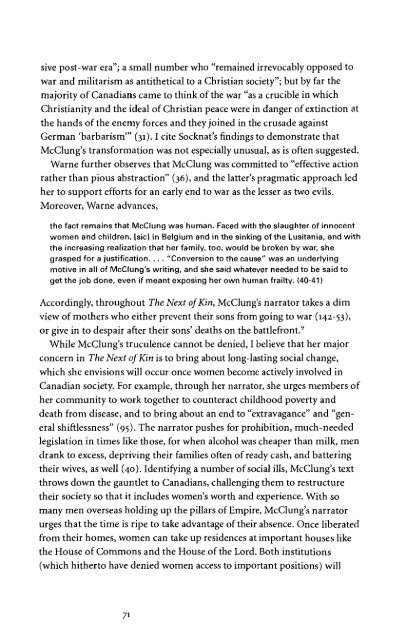Jean Rivard - University of British Columbia
Jean Rivard - University of British Columbia
Jean Rivard - University of British Columbia
You also want an ePaper? Increase the reach of your titles
YUMPU automatically turns print PDFs into web optimized ePapers that Google loves.
sive post-war era"; a small number who "remained irrevocably opposed to<br />
war and militarism as antithetical to a Christian society"; but by far the<br />
majority <strong>of</strong> Canadians came to think <strong>of</strong> the war "as a crucible in which<br />
Christianity and the ideal <strong>of</strong> Christian peace were in danger <strong>of</strong> extinction at<br />
the hands <strong>of</strong> the enemy forces and they joined in the crusade against<br />
German 'barbarism'" (31). I cite Socknat's findings to demonstrate that<br />
McClung's transformation was not especially unusual, as is <strong>of</strong>ten suggested.<br />
Warne further observes that McClung was committed to "effective action<br />
rather than pious abstraction" (36), and the latter's pragmatic approach led<br />
her to support efforts for an early end to war as the lesser as two evils.<br />
Moreover, Warne advances,<br />
the fact remains that McClung was human. Faced with the slaughter <strong>of</strong> innocent<br />
women and children, [sic] in Belgium and in the sinking <strong>of</strong> the Lusitania, and with<br />
the increasing realization that her family, too, would be broken by war, she<br />
grasped for a justification. . . . "Conversion to the cause" was an underlying<br />
motive in all <strong>of</strong> McClung's writing, and she said whatever needed to be said to<br />
get the job done, even if meant exposing her own human frailty. (40-41)<br />
Accordingly, throughout The Next <strong>of</strong> Kin, McClung's narrator takes a dim<br />
view <strong>of</strong> mothers who either prevent their sons from going to war (142-53),<br />
or give in to despair after their sons' deaths on the battlefront. 9<br />
While McClung's truculence cannot be denied, I believe that her major<br />
concern in The Next <strong>of</strong> Kin is to bring about long-lasting social change,<br />
which she envisions will occur once women become actively involved in<br />
Canadian society. For example, through her narrator, she urges members <strong>of</strong><br />
her community to work together to counteract childhood poverty and<br />
death from disease, and to bring about an end to "extravagance" and "general<br />
shiftlessness" (95). The narrator pushes for prohibition, much-needed<br />
legislation in times like those, for when alcohol was cheaper than milk, men<br />
drank to excess, depriving their families <strong>of</strong>ten <strong>of</strong> ready cash, and battering<br />
their wives, as well (40). Identifying a number <strong>of</strong> social ills, McClung's text<br />
throws down the gauntlet to Canadians, challenging them to restructure<br />
their society so that it includes women's worth and experience. With so<br />
many men overseas holding up the pillars <strong>of</strong> Empire, McClung's narrator<br />
urges that the time is ripe to take advantage <strong>of</strong> their absence. Once liberated<br />
from their homes, women can take up residences at important houses like<br />
the House <strong>of</strong> Commons and the House <strong>of</strong> the Lord. Both institutions<br />
(which hitherto have denied women access to important positions) will

















